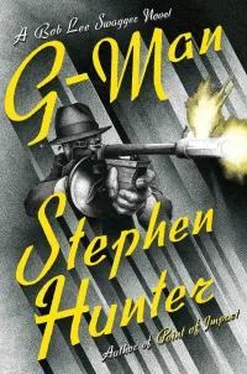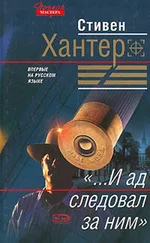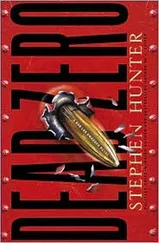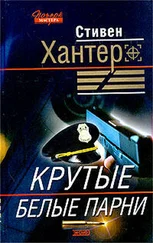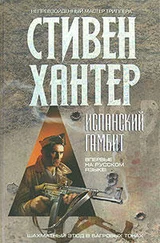Стивен Хантер - G-Man
Здесь есть возможность читать онлайн «Стивен Хантер - G-Man» весь текст электронной книги совершенно бесплатно (целиком полную версию без сокращений). В некоторых случаях можно слушать аудио, скачать через торрент в формате fb2 и присутствует краткое содержание. Жанр: Старинная литература, на английском языке. Описание произведения, (предисловие) а так же отзывы посетителей доступны на портале библиотеки ЛибКат.
- Название:G-Man
- Автор:
- Жанр:
- Год:неизвестен
- ISBN:нет данных
- Рейтинг книги:3 / 5. Голосов: 1
-
Избранное:Добавить в избранное
- Отзывы:
-
Ваша оценка:
- 60
- 1
- 2
- 3
- 4
- 5
G-Man: краткое содержание, описание и аннотация
Предлагаем к чтению аннотацию, описание, краткое содержание или предисловие (зависит от того, что написал сам автор книги «G-Man»). Если вы не нашли необходимую информацию о книге — напишите в комментариях, мы постараемся отыскать её.
G-Man — читать онлайн бесплатно полную книгу (весь текст) целиком
Ниже представлен текст книги, разбитый по страницам. Система сохранения места последней прочитанной страницы, позволяет с удобством читать онлайн бесплатно книгу «G-Man», без необходимости каждый раз заново искать на чём Вы остановились. Поставьте закладку, и сможете в любой момент перейти на страницу, на которой закончили чтение.
Интервал:
Закладка:
Swagger smiled. He wished he was still a drinking man. Here’s to you, young Hargraves, and your buddy Chavarria, at the point of the spear, doing what had to be done, not because you loved it, but because it was a thing called Duty, and your generation — his father’s as well — had a war dumped in their laps and didn’t whine, complain, explain, they just went out and won the fucking thing, and Davis, standing stoic and stark against the Wana sky, was an emblem of just that.
“You okay?” said Bill.
“Ah! Yeah, fine. That picture, the guy with the Thompson. I always tighten up a little. Reminds me of my father.”
“God bless him,” said Bill.
“And all who went ashore with him. They were the best.”
At that point, his eyes drifted. The photo, blown up so big, revealed itself in ways its publication in books or on the Net never did.
“You always notice something new,” he said to Dr. Tillotson.
“What do you mean?” said the vet.
“I must have looked at that image five thousand times in my life. Yet not to this day did I notice something strange about the BAR that Chavarria is holding. Do you see?”
For those not of the gun, Swagger’s ruminations may have seemed insane. But Dr. Tillotson had hunted on six continents and had the biggest trophy hall in Idaho, except for some oil people. He knew what a BAR was.
“I don’t see anything,” he said.
“Look at the muzzle. He’s removed the compensator. It’s just got a blunt muzzle. He must have been a strong guy, he didn’t need any help holding the thing on target, though a .30 Government kicks like hell, especially in full auto. But — and I’m only guessing here — he must not have liked the upward flash signature the slots in the compensator created. The flash might have blocked his sight. He wanted to see what he was shooting at. I can’t think of anything else that”—that’s when it hit him, hit him so hard, finally, that it knocked him out of the moment, and he had to somehow get back into it enough to finish the sentence—“uh, would explain it.”
He saw in his mind the standard BAR compensator as he remembered it from his own infantry days in the early ’60s. From there, it was a small step to the realization that the odd, twelve-slotted cylinder he had been unable to identify was exactly the same length and, by measurement, also .30 caliber. It wouldn’t have been included in any machinegun.com website or books because it wasn’t technically a machine gun; it was, by definition or sheer whimsy of the Ordnance Department, an “automatic rifle.” So it followed that perhaps at some point, in some forgotten iteration, some godforsaken experiment, or something, someone might have tried to increase the propulsive power of the compensator by enlarging the vault in which the expanding gases were trapped before they spit out of the twelve slots that dissected the roof of the cylinder to hold the muzzle down to counteract the principle of action/reaction. He could recall no such thing in his experience, but, then again, neither he nor anybody knew all the guns in the world.
It made some kind of sense if there had been such a BAR variation.
The hours elasticized into decades, then generations, before he got back to the computer in his house in Cascade.
“How did it go?” Jen called.
“Swell, fine,” he yelled in a tone that meant “I’m obsessed.”
He got on, googled Browning Automatic Rifle.
And that’s when he discovered the Monitor.
It was another second before he realized that that’s what Baby Face was doing in Mavis, Arkansas, in the week after the shooting of Johnny D. He was traveling to San Antonio, Texas, and the shop of Hyman Lebman, the gangster gunsmith and merchant. Lebman would be exactly the sort of man to sell him a Monitor.
Now, what the hell did he need a Monitor for?
Swagger realized: he had to go to San Antonio and visit what was left of Hyman Lebman, what was left of Baby Face Nelson, and, possibly, what was left of Charles Swagger.
CHAPTER 36
THE PATIO
624 NOYES
CHICAGO
August 1934
“Have you ever heard that term, Charles? Death wish?”
They sat on the patio of the big house.
“No, can’t say I have.”
“Do you have any idea what it could mean?”
This was not Charles’s game. He liked the real, the practical, the hard-edged world. Thinking deeply about things that couldn’t be seen or touched held no appeal for him.
“Well, in the war,” he groped, as the twilight came on and the lightning bugs began their illuminated pulses, “sometimes there’d be men who just couldn’t take it. It was tough, you know, the shelling, the snipers, the raids and counterraids, the mud and filth, the pressure of seeing buddies killed, and, after a while, it was hard to believe in anything, especially the future. It was said — I never saw it in the American army but I heard about it in the Canadian, where we were involved in what they called trench warfare; you know, living in mud, just waiting to get hit, for months and months — it was said that some men just gave up and walked into the German guns. Would that be a death wish?”
“Very good, Charles. That would be a death wish at the most practical level, an immediate response to an immediate and overwhelming stimulus, with no end, no relief, in sight, and all social pressure demanding that you stick it out while everything inside you screamed to run away. Yes, that would be a death wish.”
“But that’s not what you meant. I can tell by your tone. You meant something else, and I haven’t figured it out. I guess in your sense of the term, no, I ain’t never heard of a death wish.”
Where is this going? he wondered. He also knew he did not like not knowing where it was going. He hated not knowing what to do or say, being on the spot like this. What did it prove? How did it help?
“There’s some new theories of how the mind works, Charles. Recent findings in medicine and thought processes. Some folks believe that your mind is divided into two parts. One part, where you live, operate, talk, love, fornicate, work, shoot — whatever — that part is called the conscious. It’s everything you know, feel, or remember. It’s everything you think or believe.”
“Yes sir.”
“But, as I said, some folks believe there’s a second, hidden part to your mind. It’s called the subconscious and it lurks beneath. It never forgets; it harbors urges, secret pains, angers, grudges, even the impulse to resort to violence. And in some ways, at some times, it reaches out and influences what you do. And you don’t even know it. You’re confronted with choice A or B, and clearly A is the best choice but somehow you are compelled to choose B. That’s your subconscious working, influencing you to act, in some respects, against your best interests and to do things that otherwise make no sense at all. Do you see?”
Not really.
“Well, I suppose it’s possible.”
“Look, say, at these two men, John Dillinger and Baby Face Nelson. Johnny, who’s from a conventional and quite decent farm family, is sent to prison early after doing something stupid. In prison, the kings are the bank robbers; he falls in with them, learns from them, and gets his whole education and orientation from them. He, quite logically, wants to please them — they’re his real fathers — and sets out to become the biggest and best bank robber ever. See how it fits together?”
“Sure.”
“But then there’s Nelson. There’s no criminal in his family. But there’s a drunken father who beats his mother in front of him and he feels weak and worthless because he can’t stand up for her. He hates himself. As he grows up, that hatred transfers into a generalized hatred of society. There’s no influence on him, no bank robbers educating him and setting an example for him. It’s all in his mind, and somehow he sees the banks specifically, and society generally, as his father, and now that he’s brave and strong, he has this need to strike at his father. He does so by becoming a bank robber and, unlike Johnny, he’s especially vicious, he likes to kill. He hates law enforcement and takes pleasure in killing symbols of authority, like Carter Baum. That’s his subconscious working on him, making him do things that he doesn’t fully understand but can’t stop doing.”
Читать дальшеИнтервал:
Закладка:
Похожие книги на «G-Man»
Представляем Вашему вниманию похожие книги на «G-Man» списком для выбора. Мы отобрали схожую по названию и смыслу литературу в надежде предоставить читателям больше вариантов отыскать новые, интересные, ещё непрочитанные произведения.
Обсуждение, отзывы о книге «G-Man» и просто собственные мнения читателей. Оставьте ваши комментарии, напишите, что Вы думаете о произведении, его смысле или главных героях. Укажите что конкретно понравилось, а что нет, и почему Вы так считаете.
